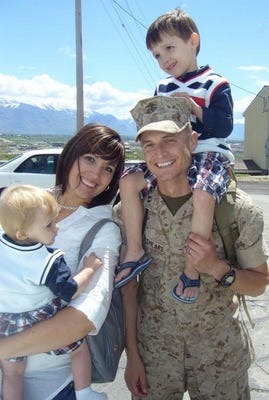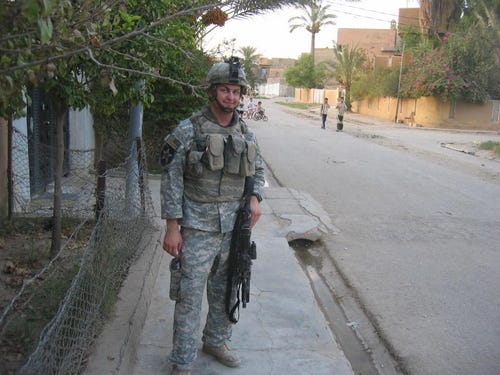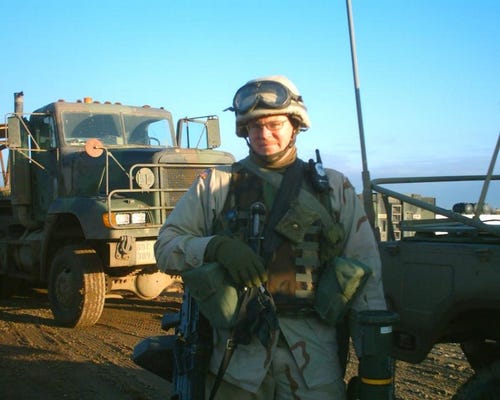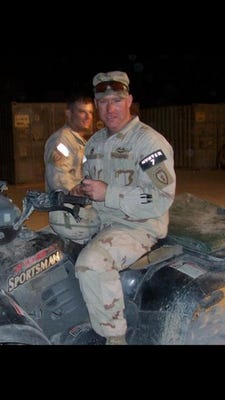source GAIA package: Sx_MilitaryTimes_M6201410306120054_5675.zip Origin key: Sx_MilitaryTimes_M6201410306120054 imported at Fri Jan 8 18:18:17 2016
 Veterans of the Iraq War and their families are watching with dismay and alarm as Sunni insurgents overrun large swaths of Iraq, including cities like Mosul, where hundreds of U.S. troops died.
Veterans of the Iraq War and their families are watching with dismay and alarm as Sunni insurgents overrun large swaths of Iraq, including cities like Mosul, where hundreds of U.S. troops died.
 "I completely disagreed with the decision to walk away from Iraq," said former Army Sgt. Kenneth Mancanares. "Now, to be honest, I'm trying to think if there's even a way I could get back out there. I'm sure there are a lot of guys feeling that way. I really wish that I could sign up on something tomorrow and join a volunteer group that's going there to stand up for these people."
"I completely disagreed with the decision to walk away from Iraq," said former Army Sgt. Kenneth Mancanares. "Now, to be honest, I'm trying to think if there's even a way I could get back out there. I'm sure there are a lot of guys feeling that way. I really wish that I could sign up on something tomorrow and join a volunteer group that's going there to stand up for these people."
 Mancanares spent more than two years in Iraq, first in Ramadi and then in Baghdad.
Mancanares spent more than two years in Iraq, first in Ramadi and then in Baghdad.
 "I lost countless friends; I've seen quite a bit of bad stuff over there," he said. "It's not about my personal feelings, 'Did I waste my time,' or 'did my buddies die in vain.' I have met those people over there and I became friends with them and I recognize their humanity. That's one of the things that is lost here ... it's so political, no one is really saying how bad it is for those people."
"I lost countless friends; I've seen quite a bit of bad stuff over there," he said. "It's not about my personal feelings, 'Did I waste my time,' or 'did my buddies die in vain.' I have met those people over there and I became friends with them and I recognize their humanity. That's one of the things that is lost here ... it's so political, no one is really saying how bad it is for those people."
The Sunni Islamic extremist group that has taken Mosul and other parts of Iraq is called Islamic State of Iraq and Al-Sham, the successor to the al-Qaida group that battled U.S. troops, said Daveed Gartenstein-Ross, a fellow at the Foundation of Defense for Democracies. While ISIS shares al-Qaida's ideology and brutality, it was formally expelled from al-Qaida in February over disagreements on tactics and leadership.
"In terms of core ideological goals, there is a lot of similarity rather than difference, but in the world of jihadism, similar goals don't necessarily mean that organizations will work harmoniously," he said.
ISIS controls a significant part of both Iraq and Syria. In the past week, it has captured Iraq's largest oil field and has come within striking distance of Baghdad. Iraqi troops and police greatly outnumber ISIS fighters, but reportedly have abandoned their posts and fled in the face of in the insurgents' advance, leaving their U.S.-made equipment behind.
Focus on heroism
Former Marine Staff Sgt. Jeremiah Workman, who was awarded the Navy Cross for his actions during a 2004 battle in Fallujah, said he understands the disappointment troops feel in seeing insurgents seize the Iraqi cities. He felt the same way when Fallujah fell, he said.
But he added that it's important to remain focused on their own personal successes — they had a mission to carry out, and they did it well.
"Just stay focused on the heroism, brotherhood and what they did for those to the left and right of them," Workman said. "We were there and we were fighting for each other. I never once thought I was there doing this for the secretary of defense."
Marines should also remember that they left Iraq a much better place, Workman said, and he knows many Iraqis were thankful.
Marine Brig. Gen. William Mullen, director of the Corps' Capabilities Development Directorate in Quantico, Virginia, agrees. Mullen, who just completed a book called "Fallujah Redux," led 2nd Battalion, 6th Marines, out of Camp Lejeune, North Carolina, in Fallujah in 2007.
What's happening now does not reflect on past efforts by U.S. troops, he said, but rather signifies failures at the national level in Iraq.
"I differentiate between what we did and what's happening now," Mullen said. "We won, we did what was required of us. Can you really ask anything more than that?"
A predictable turn
Several veterans have said the current turn of events in Iraq was predictable. When he served in Iraq, former Marine Maj. Lamar Breshears felt the Iraqis were appreciative for being granted freedom from Saddam Hussein, but they were not willing to make the sacrifices necessary to live free on their own.
"This is something that ... we all kind of thought would happen eventually," Breshears said. "So it doesn't come as a surprise. It is painful to watch knowing how much effort and time and money we put into that — lives, blood sweat and tears. [But] I can't say it's unexpected, to be honest."
During his deployment to Iraq, former Army Spc. Alex Horton's unit cleared Baquba of Al-Qaida in Iraq, which had taken over the city and declared it their capital. The Iraqis were supposed to pick up the ball afterward. Now, he feels all the time and money spent training and equipping the Iraqis was a waste.
Almost all U.S. troops had left Iraq by the end of December 2011 because the Iraqi government failed to reach an agreement that would have allowed a residual U.S. force to remain. While Horton does not believe U.S. troops would have made much of a difference in the security situation if they had stayed in Iraq, he believes U.S. and Iraqi politicians wasted the opportunity for success that U.S. troops had created.
"The talks falling apart about keeping a contingency force in there — that had nothing to do with us," he said. "That was a political decision and a political option between Baghdad and Washington. That had nothing to do with an infantry soldier on the ground. We did our end of the bargain and Washington and Baghdad failed to uphold their end."
'Why were we there?'
For Iowa Army National Guard Sgt. Benjamin Rothman, a combat medic, the news from Iraq has been "gut-wrenching." In 2003, Rothman deployed to Iraq as a chemical, biological, radiological, nuclear and explosives soldier with the Army Reserve.
"It was just really disappointing and disheartening to see the work that we'd done there being frittered away that way," he said. "It was gut-wrenching. We spent how much time and effort fighting for them, and now it's gone so quickly? Why were we even there?"
Rothman said he feels the rise of ISIS is a result of the U.S. military's departure at the end of 2011.
"We put a lot of effort and we said we were going to do this, and when things were getting to the point where we either stick it out and make a difference or pack up and go home, we packed up and went home," Rothman said.
"Having been brought up in a military household and being in for 20 years, that's not what we do. You buckle down and finish the job. We should have had a better plan to begin with, but then stuck with it."
Former Army Sgt. Steven Jerome, who served in Tikrit is especially angry and disappointed with events in Iraq because he remembers the euphoria Iraqis felt during the 2005 referendum on the country's constitution.
"We see those kinds of events here in the U.S. all the time, but these were a first for the Iraqis," Jerome said in an email. "It was exciting to see them take to it with zeal, and satisfying knowing we helped give them that chance. Today, it seems like they lost that drive and just gave up rather than fighting for it. Maybe that was our fault by essentially handing it to them rather than them having to take it."
A taste of freedom
While former Army Sgt. 1st Class Peter Villa also isn't surprised that security in Iraq has deteriorated, he hopes Iraqis will be inspired by what U.S. troops accomplished there to get back what they have lost.
"I hope our sacrifices were worth the two to three to five years [during which] they tasted freedom in that country," said Villa, who spent 10 months in Mosul early in the war and deployed there twice. "I hope what we sacrificed will lead them to say, '[The Americans] did it, so maybe we need to do it now,' instead of running away."
Army Staff Sgt. Richard Baca II, who served in Baghdad and Nasiriyah, said he feels one reason for the current situation in Iraq is that U.S. troops were not allowed to destroy the enemy because Washington officials let politics get in the way of the mission.
"We would get reports of large amounts of insurgent activity or IED activity or we would tell higher up that the Iraqi police on the ground were telling us that al-Qaida or terrorists were in certain parts of the city and we would want to act upon that and try to root them out — and we would be told that wasn't our mission, our mission was something else," said Baca, who serves with the New Mexico National Guard.
Other times, State and Justice Department officials showed up and wanted to go to dangerous areas without wearing protective gear, he said.
"They wanted to show that they were coming in peace," Baca said. "I get that part; I truly get that part, but that was not the time to have that action happen. Let the military operate as a military. Don't send the military in to do campaign work for the United States."
'They did their part'
Coleen Bowman's husband, Army Staff Sgt. Rob Bowman, served in Mosul in 2004 and 2005. Despite the dramatic collapse of the Iraqi army that has allowed insurgents to capture so much territory, neither Bowman nor the troops who served in Mosul want to hear talk that their service and sacrifice was for nothing, she said.
"They had many, many accomplishments while they were there," Coleen Bowman said. "They left it a lot better than they found it. What happened after that was not up to them. They did their part."
While her husband was in Mosul, he breathed in a huge amount of toxins from dust and smoke that most likely gave him cancer, from which he died after returning home, she said. Still, she is confident that her husband's service in Iraq was worthwhile.
"About four months after he was diagnosed, they did genetic testing on him; they wanted to identify the gene that caused the cancer," she said. "They came back kind of scratching their heads and saying, 'Your body doesn't even have this gene; it's environmental.' "
"I was angry for a couple of months, and he sat down with tears in his eyes and said, 'You've got to stop being angry ... if I could go back and change anything, I wouldn't. I love serving my country and I love leading my men, and I have no regrets.' So, I thought to myself and said, 'If he's not angry and has no regrets, I can't be angry.' "
:quality(70)/cloudfront-us-east-1.images.arcpublishing.com/archetype/TTVE2SXQTZDFHMNZ23J65IUDCU.jpg)
:quality(70)/cloudfront-us-east-1.images.arcpublishing.com/archetype/DOWGKHG3CJDBLC47ASQB3C2VGE.jpg)
:quality(70)/cloudfront-us-east-1.images.arcpublishing.com/archetype/SXIZ7CLP3NA3PCNACV6WNN2RKA.jpg)
:quality(70)/cloudfront-us-east-1.images.arcpublishing.com/archetype/XZU2REWYTBD45B3MYR52BDAI5E.jpg)
:quality(70)/cloudfront-us-east-1.images.arcpublishing.com/archetype/BUJXO6UH3JEHXKE226NOGS7YEA.jpg)
:quality(70)/cloudfront-us-east-1.images.arcpublishing.com/archetype/3V5J4U4HDJDKLM5RBP2VUCO3OY.jpeg)